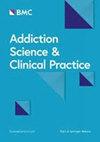针对乌干达和赞比亚艾滋病毒感染者的电话戒烟计划:随机对照试验研究方案
IF 3.7
2区 医学
Q1 SUBSTANCE ABUSE
引用次数: 0
摘要
尼古丁替代疗法(NRT)和基于短信服务(SMS)的戒烟干预已在许多人群中显示出减少烟草使用的有效性,但对于撒哈拉以南非洲地区(SSA)的艾滋病病毒感染者(PLWH)所面临的复杂的医疗和社会心理因素,哪种定制的治疗方法最有效还需要证据来证明。本文介绍了一项研究的方案,该方案旨在测试 NRT 和基于短信的定制戒烟干预措施对乌干达和赞比亚艾滋病感染者的疗效。在随机对照试验中,800 名吸烟的成年 PLWH 将由接受治疗的 HIV 治疗中心的医护人员招募。参与者将被随机分配到四个研究组中的一个:(1) 标准护理[SOC;通过短信提供简短的临床医生戒烟建议以及旨在鼓励坚持艾滋病治疗的艾滋病教育和信息(不提及烟草)];(2) SOC + 12 周 NRT;(3) SOC + 6 周支持戒烟的短信(SMS);或 (4) SOC + NRT + SMS。参与者将获得一部手机和一个太阳能电池板,电池板上装有为手机充电的电源。主要结果是研究参与者在注册后 6 个月通过尿液可替宁(< 15 纳克/毫升)验证戒烟情况。作为次要的烟草使用结果,我们将通过自我报告和入学后 4 周、8 周和 3 个月的生化验证来测量 7 天点戒烟率(连续 7 天不吸烟)。在两个烟草使用模式、政策环境和医疗资源不同的国家,我们的研究将有助于深入了解通过医疗保健专业人员结合定制的戒烟短信提供戒烟干预的有效性、可行性和适用性,并为寻求具有成本效益的戒烟干预的医疗服务提供者和政策制定者提供所需的信息。我们在研究中使用的短信平台已经过测试,具有独特的优势,可以在全球中低收入国家推广,在这种情况下,即使在降低 PLWH 中烟草消费流行率方面取得了微小的成功,也会带来巨大的健康和经济效益。试验注册:临床试验注册:ClinicalTrials.gov Identifier NCT05487807。注册日期:2022 年 8 月 4 日,https://clinicaltrials.gov/ct2/show/record/NCT05487807本文章由计算机程序翻译,如有差异,请以英文原文为准。
A phone-based tobacco use cessation program for people living with HIV in Uganda and Zambia: study protocol for a randomized controlled trial
Nicotine replacement therapy (NRT) and short messaging service (SMS)-based tobacco cessation interventions have demonstrated effectiveness in reducing tobacco use in many populations, but evidence is needed on which tailored treatments are most efficacious in meeting the complex medical and psychosocial factors confronting people living with HIV (PLWH) in sub-Saharan Africa (SSA). This paper describes the protocol of a study to test the efficacy of both NRT and a tailored SMS-based tobacco use cessation intervention among PLWH in Uganda and Zambia. In a randomized controlled trial, 800 adult PLWH who use tobacco will be recruited by health care professionals at HIV treatment centers where they are receiving care. Participants will be randomized to one of the four study arms: (1) standard of care [SOC; brief clinician advice to quit combined with HIV education and information aimed at encouraging HIV treatment adherence (with no mention of tobacco) delivered via text messages]; (2) SOC + 12 weeks of NRT; (3) SOC + 6 weeks of SMS text messages to support quitting tobacco use (SMS); or (4) SOC + NRT + SMS. Participants will receive a cell phone and solar panel with power bank for charging the phone. The main outcome is cessation of tobacco use by study participants verified by urinary cotinine (< 15 ng/mL) at 6 months post-enrollment. As a secondary tobacco use outcome, we will measure 7-day point-prevalence abstinence (7 consecutive days of no tobacco use) measured by self-report and biochemically-verified at 4 weeks, 8 weeks, and 3 months post enrollment. Our study will provide insight into the efficacy, feasibility and applicability of delivering tobacco cessation interventions through health care professionals combined with tailored tobacco cessation SMS text messaging in two countries with different tobacco use patterns, policy environments, and health care resources and provide needed information to providers and policymakers looking for cost-effective tobacco cessation interventions. The previously tested SMS-platform to be used in our study is uniquely positioned to be scaled in low- and middle-income countries worldwide, in which case evidence of even modest success in reducing the prevalence of tobacco consumption among PLWH could confer enormous health and economic benefits. Trial registration: ClinicalTrials.gov Identifier NCT05487807. Registered August 4, 2022, https://clinicaltrials.gov/ct2/show/record/NCT05487807
求助全文
通过发布文献求助,成功后即可免费获取论文全文。
去求助
来源期刊

Addiction Science & Clinical Practice
Psychology-Clinical Psychology
CiteScore
3.90
自引率
10.80%
发文量
64
审稿时长
28 weeks
期刊介绍:
Addiction Science & Clinical Practice provides a forum for clinically relevant research and perspectives that contribute to improving the quality of care for people with unhealthy alcohol, tobacco, or other drug use and addictive behaviours across a spectrum of clinical settings.
Addiction Science & Clinical Practice accepts articles of clinical relevance related to the prevention and treatment of unhealthy alcohol, tobacco, and other drug use across the spectrum of clinical settings. Topics of interest address issues related to the following: the spectrum of unhealthy use of alcohol, tobacco, and other drugs among the range of affected persons (e.g., not limited by age, race/ethnicity, gender, or sexual orientation); the array of clinical prevention and treatment practices (from health messages, to identification and early intervention, to more extensive interventions including counseling and pharmacotherapy and other management strategies); and identification and management of medical, psychiatric, social, and other health consequences of substance use.
Addiction Science & Clinical Practice is particularly interested in articles that address how to improve the quality of care for people with unhealthy substance use and related conditions as described in the (US) Institute of Medicine report, Improving the Quality of Healthcare for Mental Health and Substance Use Conditions (Washington, DC: National Academies Press, 2006). Such articles address the quality of care and of health services. Although the journal also welcomes submissions that address these conditions in addiction speciality-treatment settings, the journal is particularly interested in including articles that address unhealthy use outside these settings, including experience with novel models of care and outcomes, and outcomes of research-practice collaborations.
Although Addiction Science & Clinical Practice is generally not an outlet for basic science research, we will accept basic science research manuscripts that have clearly described potential clinical relevance and are accessible to audiences outside a narrow laboratory research field.
 求助内容:
求助内容: 应助结果提醒方式:
应助结果提醒方式:


